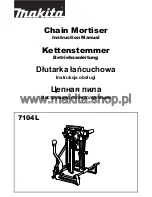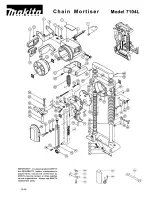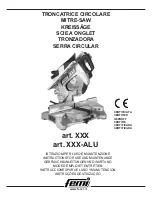
D - 33
•
Always move the mitre-cutting saw calmly and smoothly; do not apply
any sideways force to the saw blade. Make sure that the work piece
lies completely on the base plate.
•
With the saw blade is fitted the right way around (saw teeth pointing
in the direction of thrust), you will have to apply more force when
pushing the saw forward than when pulling it back.
•
Apply less pressure towards the end when sawing through a work
piece to prevent the work piece (e.g. wood) from splintering. The
flatter you guide the blade, the less likely the material will splinter.
•
You can make sawing thin parts easier by clamping in an additional
piece with a similar shape and a slight overhang to ensure that there
is enough material for safe sawing.
•
After work, loosen the saw blade again by loosening the wing nuts
(8).
Sawing soft metal
When sawing soft metals such as AI, Zn, Ni, Ms, Cu etc, use an
appropriate lubricant to cool the metal; adjust your sawing speed to an
appropriate level. Lubricants are available in hardware and DIY stores.
Always look for advice on how to use the lubricant.
Storage
•
If you cannot store your mitre-cutting saw in its assembled state, the
saw should at least be stored by hanging it up, not leaving it flat.
Care and maintenance
•
This mitre-cutting saw is virtually maintenance-free. Occasionally
lubricating the guide cylinder and slider will prevent friction when
sawing.
•
Clean the saw table, blade and base plate from dust and chippings
with a dry cloth or brush.
•
Keep the hand grip dry and free of oil and grease.
•
Do not use solvents, as these may corrode the housing.










































